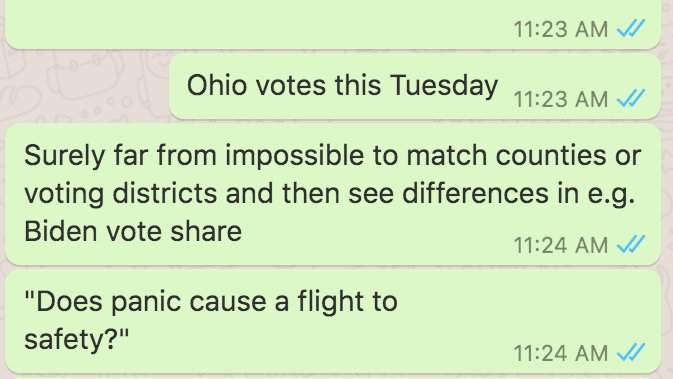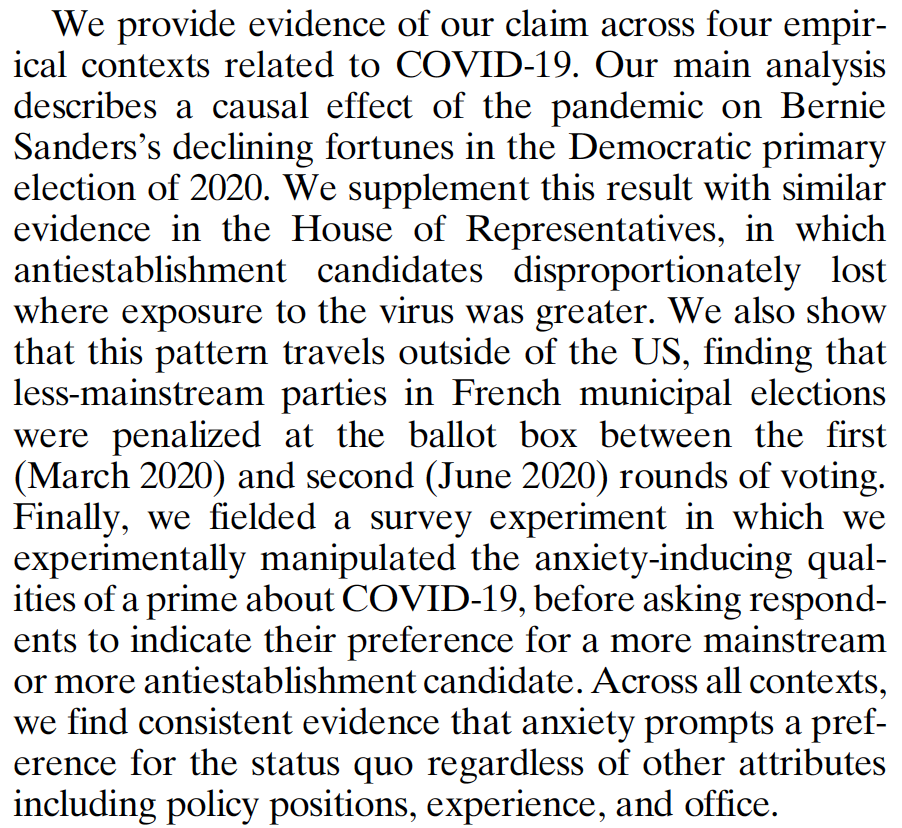Now out in @apsrjournal #APSRFirstView! Joint with @JamesBisbee, this (unusually for me) is about voters & politicians; specifically, voters' COVID fear-induced ‘flight to safety’, to the benefit of mainstream candidates. 🧵on where this paper came from & why IMO it matters 👇1/ 
https://twitter.com/CUP_PoliSci/status/1420297921292128257

It was March 13, 2020. I was home in Dakar; my “cold” had gotten bad. I was having trouble breathing, and indeed getting out of bed. I was reading an NY Times article on possible COVID futures, feeling for the 1st time genuinely scared about what that might mean for us all. 2/
I’ve spent a lot of my life living overseas. But I felt a sudden pull to be back where I still feel most comfortable, back in Detroit, that surprised me; a really strong desire for the familiarity & safety of the known, of where I feel most rooted. 3/
The next NYT story was about the Bernie/Biden race. I thought “where people feel more COVID concern I bet they vote for Biden more; that the desire for less disruptive change is stronger than the now-more-salient advantages of Bernie’s health care and social support platform.”4/
I texted @JamesBisbee, TBH mainly because I was bored, wanted to distract myself a little, and texting didn't require lung capacity. We talked as friends, but eventually as coauthors. The core ideas & empirical strategy of the published paper are in our messages from that day. 5/ 





I got better (slowly), and we got to work. Now, some 15 months later, those texts are to my surprise (and joy!), a paper with an answer to our question. That answer: areas where people had more fear voted quite a lot less for Sanders and more for Biden. 6/ 

With the help of an MTurk survey experiment, US house, & French municipal election data, we show this is not just a Biden-Bernie or US thing & not about ‘left’ vs’ right’. Voter anxiety is generally status quo-preserving. 7/ 

The effect sizes are quite large, and the flight to safety benefits not just incumbents; not just those who seemed to have ‘leadership qualities’; but the mainstream more generally, at the expense of the more anti-establishment right and anti-establishment left. 8/ 

In my view arguably most concerningly, it’s possible this electoral ‘flight to safety’ is a kind of ‘Burkean conservative’ friction lowering the prospects of radical change where/when necessary. 9/ 

I believe our current governance models and systems need somewhat marked reform to serve all citizens & ensure we have a planet humans can live on comfortably in a century. So this potential feedback mechanism concerns me quite a bit, and I think warrants further attention. 10/
In closing, let me thank first my amazing coauthor @JamesBisbee. This paper also owes a big debt of gratitude to @benlauderdale (now my colleague @uclspp, though we’ve still never met or spoken!), the @apsrjournal team, really wonderful, generative reviewers, & many others. 11/ 

To read the full paper see (gated) link at the top, or the authors' final version (ungated) is at bit.ly/3x41aOw. Thanks for reading!, Dan (12/12)
• • •
Missing some Tweet in this thread? You can try to
force a refresh





